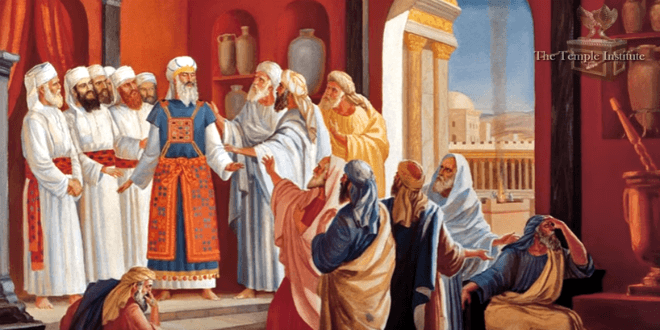This Torah portion gives the laws for the Kohanim, whose Divine service places upon them a particular responsibility to maintain higher standards of righteous behavior and purity.
Leviticus 21:1 And יהוה said to Moses, speak to the priests, the sons of Aaron וְאָמַרְתָּ and you say to them, No priest will be defiled for the dead among his people. C-MATS
Question: What was Moses saying to the Kohen in addition to this command? The Torah cautions adults to regulate their own behavior, because the example they set will have an effect on the children who see them. Chumash
Question: How can we desecrate the Name of יהוה? We are the great people of Israel, those who are crowned with distinction, and יהוה cautions us to be especially careful to avoid desecration of His Name. When we allow ourselves to take liberties not permitted to us but are taken by “unbelievers”, we desecrate His Name. The Torah tells us that our responsibilities are greater than those of others. Chumash
Discuss: How are we like the Kohen? Doesn’t Yahusha call us a chosen people, a royal priesthood, a holy nation? Are we not all Kohen? Should we keep all the commandments given to the Kohen to keep themselves pure?
Question: What is our primary responsibility? The primary privilege and responsibility of every Israelite, great or small, is to sanctify יהוה‘s Name through his behavior, whether among Israelites or among gentiles — by studying Torah and performing the commandments, and by treating others kindly, considerately, and honestly, so that people say of him, “Fortunate are the parents and teachers who raised such a person.” Conversely, there is no greater degradation for an Israelite than to act in a way that will make people say the opposite. If someone sins merely because יהוה‘s will does not matter to him, he has desecrated the Name, and if he does so before others, he has committed the far more serious sin of desecrating the Name in public. Conversely, if someone withdraws from sin or performs a commandment not because of money, pressure, or honor, but solely because it is יהוה‘s will, he has sanctified the Name. Of a person who obeys the Torah and whose general behavior brings credit to his belief in יהוה, יהוה says (Isaiah 49:3), “And He said to Me, אָתָּה You are My servant; Israel, in whom I will be glorified.” Chumash

